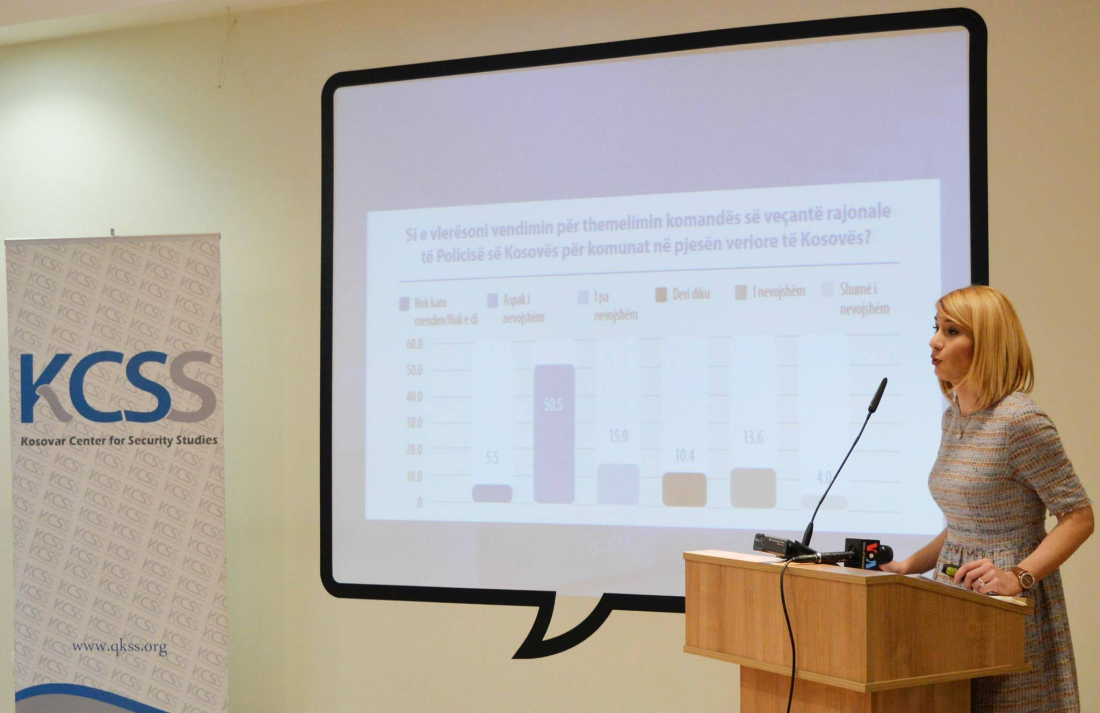15/01/2015

The Kosovar Center for Security Studies (KCSS) today launched the results of the Special Edition of the Kosovo Security Barometer - Public Perceptions towards Foreign Policy and Dialogue with Serbia. The survey was conducted during October with 1011 citizens from all over the territory of the Republic of Kosovo. This special edition of the KSB includes respondents’ answers concerning Kosovo’s foreign policy and dialogue with Serbia.
The preliminary results of the special edition show that in general, the KSB respondents appear to have different, and rather separate, perceptions towards two neighboring countries: Albania and Serbia. With respect to Albania, up to 78.8 percent of the respondents thought of it as a friendly and partner country to Kosovo. Serbia, on the other hand, is considered to be a very hostile state in the eyes of the Kosovo Albanian respondents. Up to 89.5 percent of the respondents believe that Serbia maintains a very hostile approach towards Kosovo.
While the position towards Albania and Serbia is rather clear, there are mixed perceptions towards Kosovo’s two other neighboring countries, namely, Montenegro and Macedonia. Almost half of the respondents listed these countries as neutral towards Kosovo, with 45.0 percent.
The respondents have also been asked to qualify the attitude of the key global powers and international organizations, some of which remain present with their mission in Kosovo, and the results show that the answers given by the respondents demonstrate a positive trend towards the western states and Turkey; but also that a lack of enthusiasm towards notably Russia and China can be depicted. The respondents have listed the United States of America and Germany on top of the list, being perceived as friendliest countries towards Kosovo, with over 85.0 percent of the respondents listing these countries as friendly or very friendly, followed by United Kingdom, Turkey and France that have been listed almost equally with 60.0.
A less positive trend follows states such as Russia and China which do not appear to be very popular among the citizens of Kosovo. Russia is considered as a hostile country by 85.6 percent of the respondents; while China’s policy towards Kosovo and its veto power in the United Nations Security Council has influenced the opinion of the citizens of Kosovo in general, by perceiving it as an obstacle in the international arena.
Along with relevant states, respondents were asked to give their opinion towards international organizations, some still present in Kosovo with active missions. The results show that NATO is still considered as the friendliest by the citizens of Kosovo with 85.7 percent. Similar optimistic trends follow the EU, with the findings of this edition of the KSB showing that there is a solid positive perception towards the EU. Accordingly, 61.8 percent of the respondents list the EU as a friendly organization, followed by the UN with 53.6 percent. When asked whether Kosovo should become part of the EU, around 90.0 percent of the respondents answered positively by showing a large level of enthusiasm towards EU membership.
The findings of this research show that when it comes to the dialogue with Serbia, the public opinion feels to be confronted with a fixed political decision. As a result, 58.2 percent of them support the dialogue and 38.1 percent of them do not support this process.
This edition of the KSB aimed to make an in depth examination of the perceptions towards the dialogue with Serbia. As a result, 28.7 percent of respondents believe that the dialogue should happen only if Serbia changed its approach towards Kosovo, 11.4 percent of the respondents support the dialogue on the condition of implementation of the existing agreements between Kosovo and Serbia, only 7.1 percent of the respondents claimed that Kosovo is benefiting more than Serbia.
When asked whether the dialogue has contributed to the normalization of relations between Kosovo and Serbia, 48.8 percent believe that the situation has remained the same. This is the predominant group that is more pessimistic with respect to normalization of relations between the two countries.
In general, the findings show that the overall attitude towards the establishment of the Association of Serb Majority Municipalities (ASMM), with 68.6 percent. A negative attitude is expressed towards the establishment of the Kosovo Police Regional Command in the northern part of Kosovo with 66.4 percent of the respondents declaring that this agreement was not necessary at all.
The respondents showed negative attitudes towards the dissolution of Serbian security structures in Kosovo, 62.2 percent of the respondents claimed that the agreement between Kosovo and Serbia has not resulted in the dissolution of the Serbian security structures in Kosovo and that those structures are still functioning in the municipalities with a Serbian majority.
This project is published as part of Security Research Forum "Belgrade - Prishtina - Tirana" and is supported by the American Foundation, National Endowment for Democracy (NED).